Ada Wynston
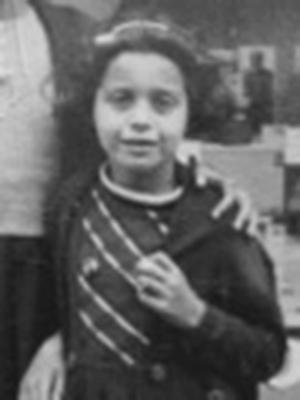
Born: Amsterdam, the Netherlands, 1936
Wartime experience: Hiding
Writing partner: Frances McKeague
Ada Wynston was born in Amsterdam, the Netherlands, in 1936. After Germany occupied the Netherlands in May 1940, anti-Jewish restrictions increased.
In 1942, Ada’s mother was taken in a roundup and deported to Auschwitz. Ada and her two younger siblings were then moved to a daycare for safety, from where they were transferred to non-Jewish families in the countryside who would care for them. Ada was in hiding with a few different families, pretending to be Christian. In May 1945, the area Ada was in was liberated and she reunited briefly with her father and her siblings, who were each living with different foster families. Ada moved in with her sister and foster family for two years. Once her father remarried, Ada and her siblings lived with them in Amsterdam. Ada graduated from teacher’s college and in 1957, she immigrated to Canada, settling in Toronto. Ada worked in accounting administration, married and raised a son, and dedicated her time to volunteering at hospitals, with war veterans and with at-risk youth. In the 1980s, Ada became involved in Holocaust education through the Christian-Jewish Dialogue of Toronto. Ada was a Dutch to English translator, a broadcaster on Dutch radio and a columnist for a Dutch newspaper. Ada Wynston passed away in 2014.
A Vivid Memory
Before age six, I remember that I had a good time and a warm family. Both my parents had a lot of siblings and I had two sets of grandparents. Some of the family would visit on Friday night for Shabbat dinner and we would eat fruit and candies. There was always music in the house, but this stopped when the war started. Soon, Jews could not associate with non-Jews; although we could visit, it was too dangerous to go outside our home because the raids started, and we might be arrested and deported. All Jews were registered by a Jewish community organization, and this is how the Nazis knew where we lived and the synagogues we attended.
After the Nazis confiscated my mother’s business, she was always home. In September 1942, after she had been home for two or three weeks, she became restless and wanted to go out. My father begged her not to go because it was not safe. My mother decided to go anyway to do errands and visit a friend. I said I would go with her because I thought it would be safer. We got on the streetcar but at the second stop, the Gestapo was waiting and ordered the driver to open all the doors. They then yelled that all Jewish people had to get off. Since my mother’s yellow star was visible, she had no choice but to get off. My star was hidden by a cardigan, which I am sure was illegal, but someone pushed me out of the streetcar anyways. On the street, I took a right turn and never looked back. When I got home, I told my father what had occurred and asked him what had happened to my mother. He said my mother was now gone. We never saw her again. Later, we were to find out that she was taken to Auschwitz and died in the gas chamber in November 1943. The picture of that day is always on my mind, sometimes more so than other days. The guilt is so vivid. I let my mother go but have always wondered if I should have gone with her, or should she have yelled for me to hurry up? My sister said I should have gone with her so she would not have been alone.
After that, we were not allowed to go into our parents’ bedroom to say goodnight because our mother was no longer there. Her being gone had a horrendous impact on our father, which we didn’t know the extent of until the war was over. He didn’t let on what he felt; he was closed off from then on.
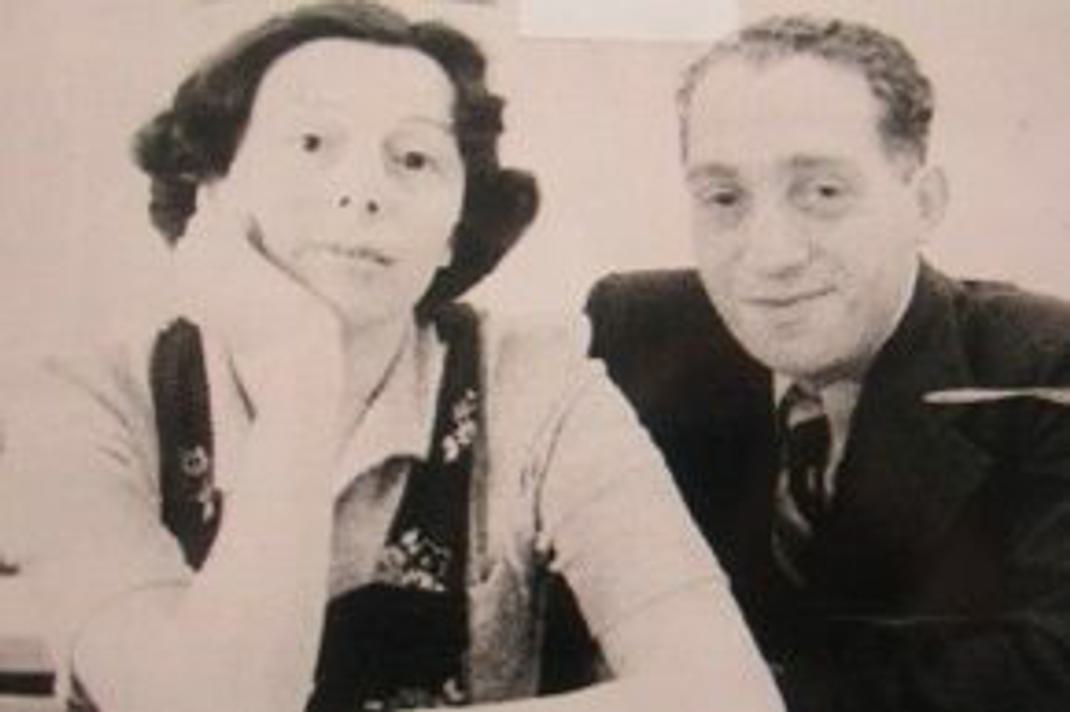
Hiding in Cellars
In the fall of 1942, the three of us were taken to a former Jewish daycare centre, which now housed children who would be transferred to the camps, and it was guarded by the Nazis. At the time we were there, there were more than two hundred children in the centre, from babies to age twelve. My father went into hiding with a Christian family, where he remained for the duration of the war.
The Dutch Christian churches, notably the Dutch Reformed and the Christian Reformed, began a resistance movement to save the children by smuggling them out. As a result, at least six hundred children survived. The resistance was made up of young university students, around twenty years old, who were devout Christians. Pictures were taken of all the children to show to Christian families, who were then asked if they could take them in. My brother was placed with a Roman Catholic family in the south and my sister with a Protestant family, where they stayed for the duration of the war.
After I had been in the centre for about a week, a young man came and took me by train to Brunssum, about two hundred kilometres south, to a transit home owned by the Vermeer family. Transit homes were used to house children until a permanent family could be found. This one was a small house with only one toilet. The family were devout Christians with fourteen children, four of whom were in the resistance. Thirty-four children were hidden in their cellar — a small dugout under the kitchen sink. It was traumatic and uncomfortable there, with only chores to keep us occupied, such as peeling potatoes and cleaning vegetables. It was difficult to be all huddled together, and we could only leave the cellar at night to go out into the meadow, which was used as our toilet. It was October, and the weather was chilly. If you didn’t use to pray, you certainly did then.
Three weeks later, the same young man came to get me, and he put me on his bicycle. He talked to me as he rode, telling me that I could no longer be a Jew and that I had to be a nice Christian girl. If not, I would be kicked out of my new home. I said, “Christian, I don’t care, just not a nice girl.” I am still in touch with that young man, who is now ninety-one.
I was taken to a family in Geleen, which was about fifteen kilometres from Brunssum, but I stayed there only six weeks, until January 1943. I didn’t remember that time until several years ago, when one of the sisters in that family found me. It was too dangerous there and betrayals were possible. I was the only Jewish girl and the family had seven children of their own. They endangered their own children’s lives to help me. Why? Jesus was a Jew, I was told, and that reflected the devout Christian position.
Once again, I went on that young man’s bicycle, and we journeyed, far this time, to the home of Mr. And Mrs. van Breugel in Leerdam, 150 kilometres away. This placement family had five children of their own and was well known in the community, as the father was a manager in the mayor’s office. I was told I had to listen to them and attend church twice on Sundays. The Christian church was very Orthodox but I didn’t mind going since it got me out of the house. I learned the songs, hymns and psalms, and I enjoyed the organ music.
In addition to me, there were nine other Jewish children in various homes in that community. We all survived. Aside from church on Sundays, I stayed home all day because it was too dangerous to go out. There were so many collaborators and betrayals that we couldn’t take the chance. I couldn’t attend school with the Christian children, so I stayed home with the eldest daughter, who was a teacher. I learned some French and the Christian songs from her and I was generally kept busy. I learned to listen, but I also learned to lie about who I was. I didn’t like lying, but I got used to it.
One day, the mother felt it was safe for me and the two younger girls to walk into town. Things had been peaceful, so we went out for a walk. There were lots of Germans in the town and a German soldier stopped us and asked to take our picture. We couldn’t say no.
The picture was taken, developed and put in the window of the only pharmacy in town, as requested by the soldier. I think the soldier was homesick and wanted to look at the picture to remind him of his family back in Germany. The pharmacist, however, was a Nazi and a collaborator. He knew my war father well and realized that I didn’t belong to the family. While my war father was walking home one day from the mayor’s office, he saw the picture and asked if he could have it. He took it home and told me that he had a feeling something was going to happen that night, that the pharmacist would have told the Nazis in town about me.
I was told to go upstairs early and go to bed. Their five-year-old daughter also had to go to bed, and act as if she were ill. She never forgave me for having to do this. I lay on a slab of wood and another slab was placed on top of me, then a double mattress on top of that. The bed was made up and I was told not to move, cough or sneeze. I could hardly breathe and I was scared stiff. The other girl was in the same room. Some time passed and then two Nazis came into the bedroom. I heard their boots on the stairs. They saw the other little girl sleeping and then went over to my bed and stuck their bayonets through the bed. No blood. No Jew. They left. I heard the door slam and started to wiggle but was told to stay put for about twenty minutes. The Nazis had a habit of leaving, having a smoke and then returning if they could not find any Jews the first time. If they did find Jews after returning to the house, everyone would be shot. As a seven-year-old, I did not understand this.
As a result of this incident, I had to leave the home and the father also had to go into hiding. I had been with this family for ten months, from January to October 1943, and really felt part of them. They were wonderful people. The mother was tough — she had to be because she had five children — and the father was a lovely, warm person. He contacted his sister in another town nearby, asking if anyone could take in a Jewish girl. Without hesitation, she said yes. She sent her eldest daughter, Elly, to get me on her bicycle. I left in my pyjamas and wooden shoes.
On the way to her parents’ farm in Nieuwendijk, she talked to me, indicating I could probably have a normal life and perhaps go to school. She had three sisters and a brother. When we arrived, her mother was waiting for us and yelled at her daughter to hurry, get in and put the bicycle away. She didn’t ask my name but placed me in the cellar and locked the door, telling me not to come up. I was getting used to cellars and did not ask any questions.
Just before we arrived, part of a German regiment had come into this small town and quite a few soldiers were billeted upstairs in the farm. When they went out to fight, I was allowed to come up and eat breakfast. I did chores and I tried to learn how to milk a cow, but that wasn’t successful. I got more milk into my mouth than in the bucket. It was very hard and I indicated to the family my sorrow in not being able to do that chore. The Rombouts were wonderful people and forgave me. To this day, I still don’t drink milk. I was then taught to kill chickens. I was not upset doing this because by then I had become aggressive. I was given an axe and instructed to cut off the chicken’s head. I did this and saw it walking around the yard until the tendons had died. I still eat chicken.
I was not aggressive before the war. I was a pampered child and was my father’s favourite. During the war, with the hiding, living in cellars, doing what I was told and the lying, the aggression began. But I learned to listen and behave, because to do otherwise would not only endanger my life but also the life of my war family. The boy on the bicycle had been the first to tell me that I must behave at my new home, or I would be thrown out. For a seven-year-old, this meant being killed by the Nazis.
The boy on the bicycle had been the first to tell me that I must behave at my new home, or I would be thrown out. For a seven-year-old, this meant being killed by the Nazis.
Difficult Reunions
During this whole time, I didn’t know anything about my family — I had been lost in what was happening and I hadn’t thought of my father or my siblings. I had no idea where they were. I thought a lot about my mother, though. I later found out that the Americans had liberated the areas where my sister and brother were in September 1944.
When my area was liberated on May 5, 1945, I put on my wooden shoes and left the farm. I saw lots of people at the top of a hill, waving the Dutch flag, and I asked a woman who knew I had been in hiding if I could please stand with her.
There were no more Nazis in the town, but I saw soldiers standing there, other soldiers, who had marched into town — Canadians. They were our liberators. The Canadian soldiers were generous to the children, giving them gum and pieces of chocolate, but I didn’t receive any. I asked if these soldiers hated Jews as well. One soldier, just a boy really, not more than nineteen, had a banana. He gave me the banana but neglected to tell me it had to be peeled, and I had never had a banana before. When he observed that I was trying to eat it, peel and all, he came back and showed me how to peel it. This memory is as vivid as when my mother was taken because it was the first time that a soldier was kind to me. I should have asked for his name and address, but at that time I had no idea that I was going to live in Canada.
Then I started to walk, by myself, back to Amsterdam. I was not quite nine years old, and I wanted to go home because the war was over and I wanted to find my family. I didn’t realize it was fifty kilometres away. My war mother was never far behind me so she stopped me and suggested I remain with them until we could find out about my family. Then, they would see what could be done. I had no choice, so I went back.
I had a special hiding place I was supposed to go to if I was not able to get to the cellar. In the kitchen, there was a table with a drape. I was to run to the table, sit on a stool underneath it and put the drape around me. Although I never had to use this place during the war, I did use it twice after. Once, I saw a strange man coming to the house on a bicycle with flat tires. He had a very skinny face, grey hair and blue eyes. He was my father, but I didn’t recognize him. I ran and hid under the table and wouldn’t come out even though my war mother was reassuring me. I remembered my father as having reddish-brown hair and sparkling blue eyes. He was always whistling, always laughing. My father left, knowing I was fine, but returned three months later. Same thing — I hid again, but this time he had brought my old doll with him, so I came out and grabbed my doll. Before going into hiding, he had taken something that belonged to each of his three children, as well as to my mother. He took my mother’s diamond ring, which I now have on a chain around my neck. I didn’t take off the chain for more than forty years. It kept my mother close to me.
My father stayed for lunch. He was starving and I was embarrassed because he took so much butter and jam while we were required to use everything sparingly. He then told me that I had to listen to him. He said that he couldn’t take me home with him because our mother was gone and he had to find someone to marry who would look after me. He said I could either stay with the war family or go to a Jewish orphanage. He told me there was no family left. Both my parents had had ten siblings each, but they were all gone now. I had no grandparents, aunts, uncles or cousins. Then, almost as an afterthought, he told me that my brother and sister were alive. I was so angry with him for not telling me this first. He gave me their addresses.
I remained with my war family for a few months and then asked if I could please go and find my brother and sister. At age nine and a half, my war mother put me on the train and off I went. Talk about being independent! That was because of the war — I just did what I had to because I was so anxious to hold on to some family.
I found the home where my brother, Sidney, was staying and knocked on the door. When his war mother, Mrs. Verstappen, opened the door, I asked if I could stay. She was a lovely lady but told me I could only stay if I became a Roman Catholic; otherwise, it would upset my brother if he found out I was Jewish. I responded, “Madam, the war is over. I was a Jew once. I was Dutch Reformed for three and a half years, but I am a Jew now!” My little brother, age six and a half, taught me the rosary and the Hail Mary. I never got past than the second bead on the rosary — it was either too upsetting, or I would giggle.
At one point, Sidney took me to the garden and in a bullying manner asked if I was Jewish. I said, “Yes, I am Jewish,” to which he responded, “You are going to Purgatory.” I told him that if I was going so was he because he was Jewish as well. He yelled, “No, I am a good Roman Catholic!” After a while I found living there too difficult and the mother agreed I could leave and find my sister. Sidney and I didn’t speak again until we met up two years later.
I eventually found my sister, Betty. Her war parents, Mr. and Mrs. Hamstra, were the kindest people. They had been ready to adopt a child before the war, so when my four-and-a-half-year-old sister came to them, they all settled in. She even attended school for the duration of the war. The family was Protestant and I had an easier time fitting in because I had been with Protestant-Christian families. My sister and I got used to each other, but we were not really getting along. Her war parents gave us each a pet lamb and told us to take care of the animals, love them and then perhaps the two of us would learn to like each other. It took time, but it eventually worked, and I stayed there for about two years. The war parents told us that if our father wasn’t able to take us, we could remain with them, and that our little brother could come as well.
In 1947, my father found a woman to marry, and we returned to Amsterdam. She was “tough as nails” and had been in the resistance. She agreed to marry my father so he could get his children back. Unfortunately, we were taken from security into a hellhole. My father was destroyed by the war and my stepmother was a very strong woman. The return to our family was hard on everybody — the war parents had considered us their children. We weren’t, however, ever baptized because our war parents always thought our birth parents would come back for us.
The only thing I can say about my stepmother was that she was an extremely good cook. On our first day back, she made a beautiful meal for dinner. Before we ate, my brother made the sign of the cross and said his prayers. I also said my prayers out loud. My sister, being the family joker, said, “Please, God, hurry up because I am hungry, amen!” My father was very angry and slammed his fist on the table, ordering us to stop. He said there is no God, because a God would not allow this to have happened to us. We weren’t allowed to pray until we became of age, which in the Netherlands then was twenty-one.
I was not allowed to ask either my father or stepmother any questions relating to the war. My father was a closed person, and my stepmother would freak out. The past was not referenced. There was an old photo of my mother and father that I rescued from the garbage. My stepmother kept throwing it away and I kept putting it back on our piano. I just couldn’t get along with her.
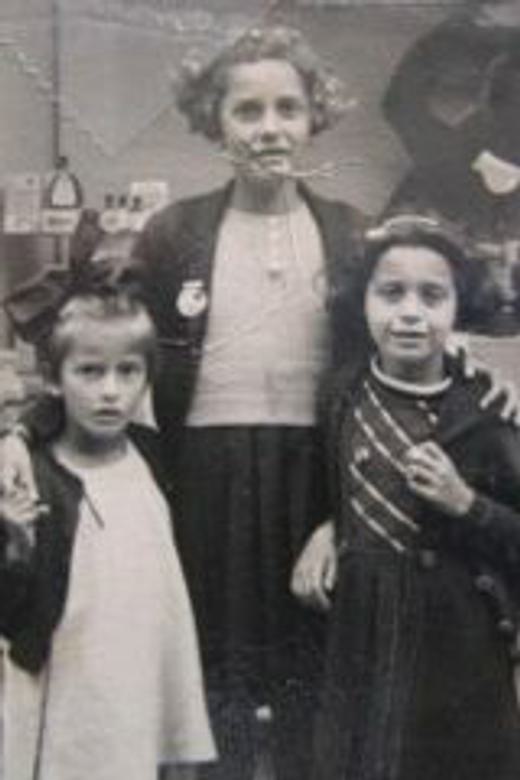
Ada (right) and two of the van Breugel children, in the photo taken by a German soldier that was displayed in the pharmacy in Leerdam. The Netherlands, circa 1943.
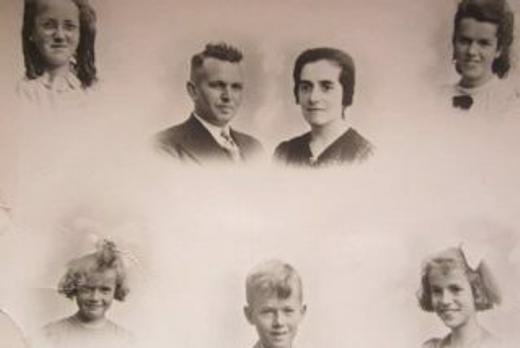
The Rombouts, Ada’s war family in Nieuwendijk. Top row, left to right: Adrie, Mr. Rombout, Mrs. Rombout and Elly. Bottom row, left to right: Reika, Jan and Corry. The Netherlands, date unknown.
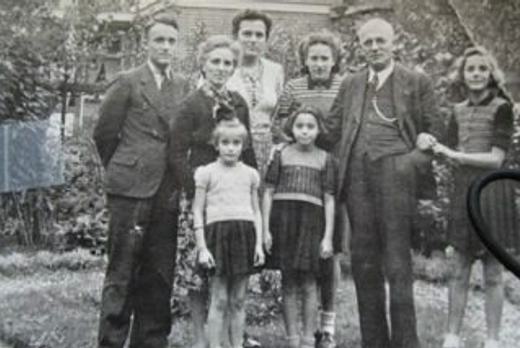
Ada (front, right) with the van Breugels, her war family in Leerdam. In back, left to right: Jan, Mrs. van Breugel, Dinie, Jeanne, Mr. van Breugel and Anke. In front, Ida (left) and Ada (right). The Netherlands, circa 1943.
Our War Parents
After I came to Canada, I initially did not have much contact with my brother and sister. I wanted to sponsor my brother to come to Canada, but he was eighteen at the time and was conscripted into the army. After that, he cut off all ties with the family and it was twenty years before we resumed contact. Sidney was so young when the war started that he really doesn’t have memories of it. He always said that he had no war, and that the war started for him when peace broke out. It was horrible living with my father and stepmother. I see my brother a lot now, but when something comes up about the war, the subject is changed.
When I tried to get my sister to come to Canada, my father would not allow it. She married young, had five children and stayed in the Netherlands. They were quite poor and I sent them money. My sister and brother were both so young when the war started that they really do not remember our mother, grandparents or relatives, and neither of them want to talk about it. Their war parents were very good to them, and they perhaps should have stayed with them after the war. I was that much older and have more memories. Their memories are their war parents.
Our war parents were such lovely people, and after we returned home, we missed them. We did, however, still keep in contact with them. Although many Jewish child survivors did not keep in contact with their war parents, we did — it just felt normal for us to do so. When my sister came back home, she would cry to go back to them to the point where our father wrote to the war parents telling them she was happy and to leave her alone. I still speak to my war sisters and have always kept in contact. When we were older, we vacationed with them.
We also took care of our war parents until they died. My sister lived across the street from them and would visit daily. When my sister went on holiday, I travelled back to the Netherlands to look after our war mother, making sure she took her medication and had her Meals on Wheels delivered. We considered this normal, to be looking after our war parents as they got older. They were such good people.
On one occasion, my sister and I accompanied our ninety-year-old war mother to a medical specialist’s appointment. We were prepared not to listen to what the doctor had to say but our war mother would not hear of this and asked us to stay saying, “You are my daughters.”
It was hard on her after the war, when she had to accompany us back to Amsterdam. As my sister said, “She was crying without making a sound.” She was such a warm person, and she was hurting. She had come to see us as her own children, and we were being taken away from her. Both my sister and I would have preferred to stay. As we got older, in high school, we would visit on our school vacations. If we didn’t have money for the train, we would hitchhike to the south with our bicycles slung over our backs. We had such wonderful vacations. We were unrestricted and felt free to come and go as we liked. The neighbours all knew us. There was no one telling us to stay inside and there were no fights. We had fun; we were free.
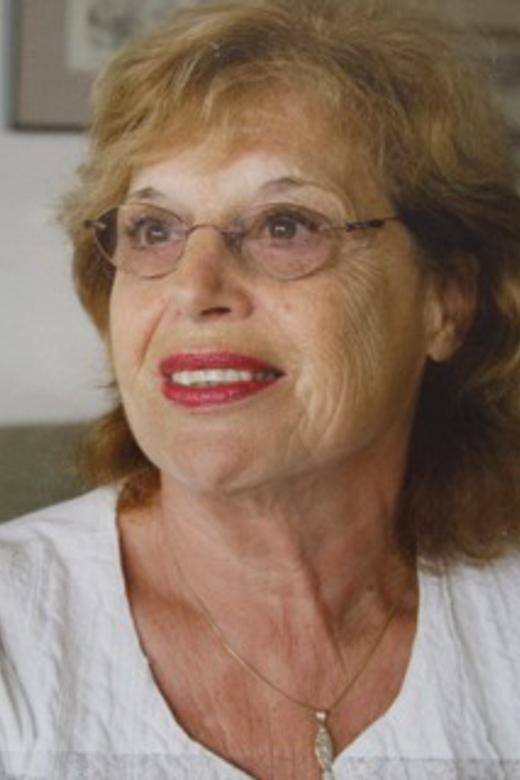
Ada Wynston, circa 2010.
Ada (right) with her Sustaining Memories writing partner, Frances McKeague. Toronto, 2013.

